The Brookings Institution
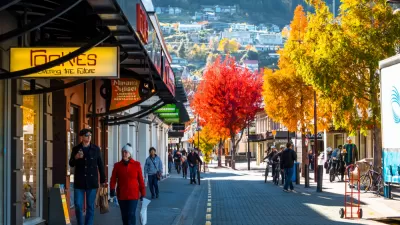
Zoning Reform: Lessons From New Zealand
The island nation is mandating mid-density zoning requirements and transit-oriented development in an effort to increase housing affordability and encourage compact development.
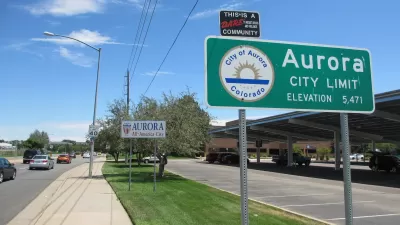
Mobile Social Services Address Gaps in Suburban Colorado
In the Denver suburb of Aurora, nonprofits are using 'mobile public spaces' to reach refugees settling in the autocentric community.
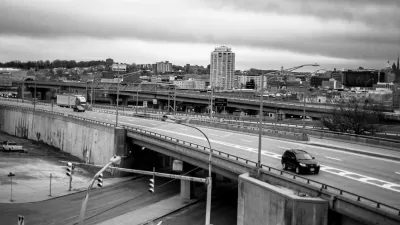
How to Prioritize Equity in the Infrastructure Bill
Experts recommend a more rigorous focus on equity considerations as the federal government begins to select projects to fund through the Infrastructure Investment and Jobs Act.
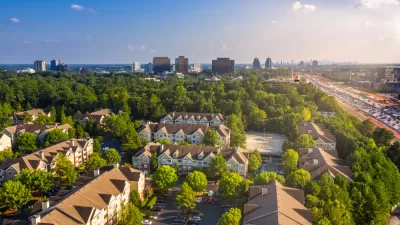
Report Links Housing Growth and Climate Resilience
Data from three U.S. metro areas show a failure to address land use and sprawl as a key factor driving climate change.

Place-Based Initiatives Would Win Big With Build Back Better Act
The Build Back Better legislation could bring much-needed support to place-based economic development programs.

Report: How States Can Improve Housing Policy
While many policies that affect housing are decided on at the local level, there are several steps state officials can take to pave the way for healthier housing markets.
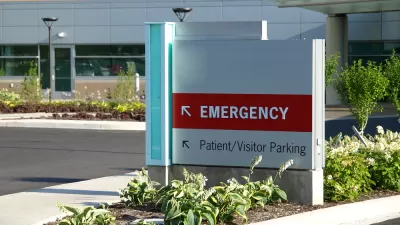
A Missing Conversation: Medical Centers and the Built Environment
Hospitals, medical research centers, and the like are supposed to represent health, but are often an unappealing and monolithic presence in the urban landscape. How can the form of health centers fall in line with their function?
The Impact of Metro Freight Trade on Congestion
Although the holidays cause millions more drivers to hit the road, delays in traffic may also stem from the congestion of goods movements by truck, both locally and across the country.
Millennials and Gen Xers Commuting Less by Car
Following up on earlier reports about the latest commuting data from the U.S. Census 2013 American Community Survey, Joseph Kane and Adie Tomer find different trends in commute choice between age groups.
Two Narratives Derived from New Commute Data
When it comes to making sense of the American Community Survey's data on commute times, it's all about how you frame the data.

Innovation Districts: The Next Big Urban Idea
In his look ahead to the big idea that will shape 2014, Bruce Katz identifies the emergence of the "Innovation District" - a shift in the "spatial geography of innovation" from isolated corporate campuses to mixed-use urban districts.
Minorities Transform Metro Areas, Inch Closer to Majority
Minorities comprise in 2010 more than half the population in 22 of the largest metro areas in and 98 percent population growth in large metro areas from 2000 to 2010, a recent report by The Brookings Institute shows.
Minority Youth Lead Shift to Majority
Minorities are becoming the majority in the United States, and the shift is most pronounced in populations under one year of age.
Brookings Compares 'Zero-Vehicle Households' To Those With Vehicles
Not to be confused with zero-emission-vehicles, the Brookings Institution looks primarily at the demographics and access to jobs of what they define as zero-vehicle households. Access to vehicles reveals equity (income) and urban vs. suburban issues.
Poverty Aid Misfocused
As aid programs continue to focus on battling poverty in cities, suburban areas are becoming the new front lines.
Demographic Change Creates New Types of Regional Metropolises
Though population growth rates have slowed in cities and suburbs, their increasing interconnectedness has created sets of diverse metropolitan areas, according to the Brookings Institution's Alan Berube.
Suburbs or Cities: Which Has More Crime?
A Brookings Institute report shows that the difference between crime in the suburbs and cities has drastically decreased, and argues that the current drop in crime rates weakens the correlation between ethnic groups and crime.
Tracking Recovery in American Metros
This latest report from The Brookings Institution tracks economic recovery in 100 American metropolitan areas
The Biggest Misconceptions About the Census and Demographics
The Brookings Institution lists out the five biggest myths and misconceptions about the Census and the way demographics change in the U.S.
Obama's Infrastructure Grade: A-
A year ago, the Brookings Institution offered a series of suggestions to the Obama Administration for addressing infrastructure problems. Some advice was followed, other suggestions weren't. The Institution gives the Administration an A- for 2009.
Pagination
City of Costa Mesa
Licking County
Barrett Planning Group LLC
HUD's Office of Policy Development and Research
Mpact Transit + Community
HUD's Office of Policy Development and Research
City of Universal City TX
ULI Northwest Arkansas
Town of Zionsville
Urban Design for Planners 1: Software Tools
This six-course series explores essential urban design concepts using open source software and equips planners with the tools they need to participate fully in the urban design process.
Planning for Universal Design
Learn the tools for implementing Universal Design in planning regulations.
































